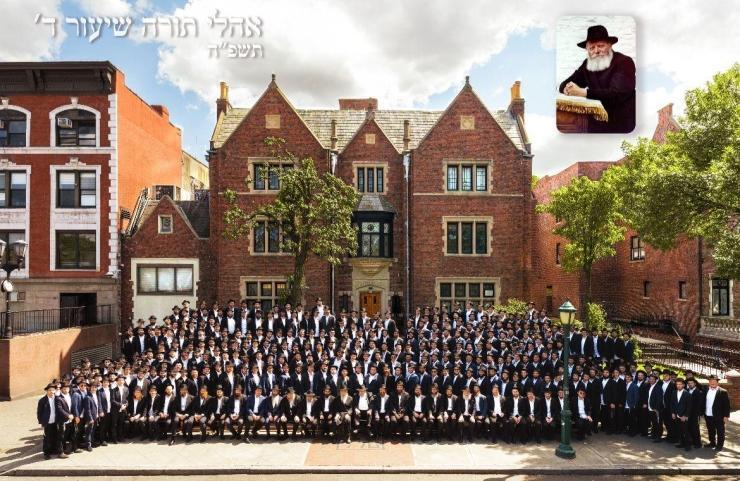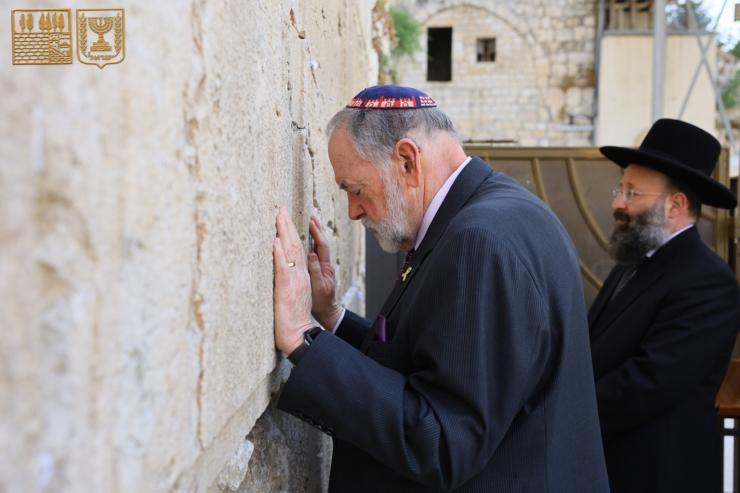Bring Miraculous Change to the World
One of the last episodes recounted in the Torah in parshas Chayei Sarah about Avrohom Avinu, requires deep explanation. “And Avrohom took another wife, and her name was Keturah. And she bore him Zimran, Yokshan, Medan, Midian, Yishbak, and Shuach.” • Full Article
BEGIN WITH A GRIN
An Arab, an Israeli, a Russian and an American are in the restaurant together, waiting for their orders. A reporter comes over to them and asks, “Excuse me, what’s your opinion on the global meat shortage?”
The American says, “What shortage?”
The Arab says, “What meat?”
The Russian says, “What’s an opinion?”
The Israeli asks, “What’s ‘excuse me.’”
IT’S A MIRACLE!
One of the last episodes recounted in the Torah in parshas Chayei Sarah about Avrohom Avinu, requires deep explanation. “And Avrohom took another wife, and her name was Keturah. And she bore him Zimran, Yokshan, Medan, Midian, Yishbak, and Shuach.” Avrohom, who had already been married twice, to Sarah and to Hagar, and lived with Sarah for more than a hundred years and had two sons from his two wives, married for the third time to a woman named “Keturah” and had six children with her.
A simple calculation shows that Avrohom was then 140 years old! As told at the end of the previous episode (24:62), when the servant returned with Rivka to Avrohom’s house, they met Yitzchok coming from “Be’er Lachai Roi.” Rashi explains that Yitzchok went to bring Hagar (alias Keturah) for her marriage to Avrohom his father. And since Yitzchok was then 40 and was born when Avrohom was 100, it follows that Avrohom was 140 at the time of his third marriage.
And here the simple question arises: when one son (Yitzchok) was born to Avrohom when he was a hundred, we made such a fuss about it, “And Avrohom fell on his face and laughed, saying in his heart, ;Shall a child be born to one who is a hundred years old?’” “And Sarah said, ‘Who would have said to Avrohom… that I would bear a son in his old age,’” but here, in Avrohom’s marriage to Keturah, six sons were born to him at age 140, and there is no mention of the greatness of the miracle and the wonder of it, why? Doesn’t the family deserve some credit? Six children at the age of 140 is not a trivial thing!
In an enlightening sicha, originally said in connection with the global siyum ha’Rambam, the Rebbe resolves these matters in an innovative way. The depth of the answer lies in the birth of Yitzchok, where it says: “G-d has made laughter for me, all who hear will laugh with me,” and Rashi explains the meaning of the laughter and joy in Yitzchok’s birth: “Many barren women were remembered with her, many sick people were healed on that day, many prayers were answered with her, and there was much laughter in the world.”
This means that Yitzchok’s birth brought salvation and deliverance to the world, to the point that it brought joy and much laughter to the world. And exactly what happened to Sarah happened also to Avrohom. Just as the miracle of Yitzchok’s birth caused several more miracles for Sarah and in Sarah’s merit, so too with Avrohom the miracle of Yitzchok’s birth caused more miracles for him, and therefore more sons were born to him miraculously through his marriage to Keturah. This means that the birth of Keturah’s children is a miraculous result of Yitzchok’s birth, and therefore these births are not given special importance, because they are only secondary and peripheral results of the central and important miracle that caused all other miracles: the birth of Yitzchok.
But a reason is needed – why should Yitzchok’s birth bring about more miracles? And what is this meant to teach us today?
It is known to all that before Yitzchok’s birth, G-d changed the names of Avrohom and Sarah. Avram became Avrohom, and Sarai became Sarah. The meaning of the name change was to show Avrohom and Sarah’s dominion and influence over the entire world. Avrohom was called so because “I have made you a father of many nations,” and Sarah because she was “princess over all.” This means that the birth of Yitzchok (and the Jewish people in general) came through complete control over the world and the nations of the world, and therefore Yitzchok’s birth brought salvation and deliverance, many miracles and wonders, to the point that “there was much laughter in the world.” All because Avrohom Avinu and Sarah Imeinu represent the Jewish nation, which is meant to rule and influence the entire world, and this dominion is not negative, but rather brings great good, salvation and deliverance, miracles and wonders, laughter and joy to all the world’s inhabitants.
The world was created for the sake of Torah and for the sake of Israel (the Jewish people), therefore Yitzchok’s birth (which is, in essence, the birth of the Jewish people) affected the entire world, and therefore the miracle of Yitzchok’s birth caused “many barren women to be remembered with her,” and also regarding Avrohom, it was Yitzchok’s birth that led to the birth of Avrohom’s children from Keturah.
[Or, in somewhat more contemporary terms; instead of the nations of the world complaining about “the Jewish occupation,” they should thank us for it, as it’s only because of the “occupation” that they are living and existing, being fruitful and multiplying].
TO DO A MIRACLE OR TO BE A MIRACLE
However, a deeper examination reveals a significant difference between the effect of Yitzchok’s birth on Sarah Imeinu versus the effect on Avrohom Avinu. Yitzchok’s birth brought about many miracles for Sarah and this happened a) immediately, and b) automatically, without any action on her part. In contrast, for Avrohom Avinu the numerous miracles came only a) after forty years, and b) through marriage and bringing offspring into the world. What is the significance of this difference?
As mentioned above, the birth of Yitzchok (and the Jewish people in general) symbolizes Jewish influence on the nations of the world. In this influence there are two modes, one mode expressed through Sarah, and a second mode expressed through Avrohom. There is influence through coercion (either by force or through words) and there is indirect influence, which happens as if by itself. The first influence is done through action and takes time, the second influence happens automatically and is not dependent on time at all.
The difference between these two types of influence is expressed in relation to the true and complete Redemption. As is known, the Rambam concludes his book Mishneh Torah with two chapters dealing with Yemos HaMoshiach and the Ultimate Redemption, chapters 11-12 in Hilchos Melachim. At the end of each of these chapters, the Rambam refers to the state of the world and the nations of the world in the future. But there is a central difference between the wording in chapter 11 and the same wording in chapter 12.
At the end of chapter 11, the Rambam writes: “And he will rectify the entire world to serve G-d together, as it is said, ‘For then I will transform the peoples to a pure language that all of them call in the name of G-d, to serve Him with one purpose.’” That is, it speaks of the direct influence of the Moshiach on the nations of the world. Moshiach is the one who fixes the world through re-education, and through changing the laws and general way of thinking in the world. In contrast, at the end of chapter 12 it says: “And at that time… the occupation of the whole world will be only to know G-d, and therefore Israel will be great sages and know hidden things.” The Rambam’s main emphasis here is that the world will change by itself as a result of the spiritual work of the Jewish people. These words contain no mention of any action that the Jewish people need to take, but rather of an automatic change in the nations of the world as a result of the change in the Jewish people. This means that the elevated level of the Jewish people affects the world, so that automatically the state of the entire world will be in the most elevated manner.
And this is the difference between Avrohom and Sarah. Avrohom represents influence on the nations of the world through action, something that takes time, energy, and engagement. Therefore, the miracles that happened to Avrohom as a result of Yitzchok’s birth occurred only after forty years (time) and only after his marriage to Keturah (action and engagement). Whereas Sarah represents the automatic influence on the nations of the world, influence that happens automatically and isn’t accompanied by actions. Therefore, the miracles that happened to Sarah following Yitzchok’s birth happened immediately (without time delay) and without any engagement or action on her part.
And regarding us, descendants of Avrohom and Sarah, we must learn from both of them. Both from Avrohom and from Sarah. We must work to influence the nations of the world to accept upon themselves the seven Noahide laws, something that requires engagement, time, and intensive action, and we must also be a “light unto the nations,” a living example of pure holiness and spirituality that will also influence the nations of the world to accept upon themselves the yoke of heaven, and thus we will merit the time about which it is said: “And it shall come to pass in the end of days, that the mountain of the house of G-d house shall be established at the top of the mountains… and all nations shall flow unto it. And many peoples shall go and say: ‘Come, let us go up to the mountain of G-d, to the house of the G-d of Yaakov, and He will teach us of His ways, and we will walk in His paths.’”
TO CONCLUDE WITH A STORY
We’ll end with a story that demonstrates the influence of a Jew over others: David Chase was an American philanthropist who was close to Chabad institutions in New Jersey. Prior to the Rebbe’s 79th birthday, the Rebbe addressed Chase and asked him for a birthday gift. The Rebbe remarked with a smile that it’s customary to receive birthday gifts and not to ask for them, but he felt close enough to Chase to ask for a gift: to buy himself tefillin and start putting them on every morning. Chase obeyed and bought himself several pairs of tefillin: one for home, one for the office, and one for the car.
Years passed and Chase began to invest enormous sums in Lech Walesa’s renewed Poland. Once he was flying in a private plane with a group of investors from America, most of whom were non-Jews. When sunrise was visible through the airplane windows, Chase found a quiet corner, took out his tefillin and put them on. He was the only passenger who did this.
Four years passed and he received a phone call from a non-Jewish businessman who was part of that delegation. The man said: “David, there’s something weighing on me and I must share it with you. Your putting on tefillin in the middle of the flight to Poland changed my life. I looked at you then with admiration. You were the head of the delegation and when a person of your stature stopped everything in the middle of a business trip and performed a spiritual act – it shook me. I started thinking about myself: ‘Do I have a purpose in life? Am I living for something greater than myself?’ Know that that moment changed my life…”
Good Shabbos!
32
Join ChabadInfo's News Roundup and alerts for the HOTTEST Chabad news and updates!









































